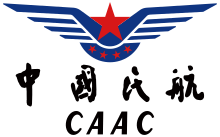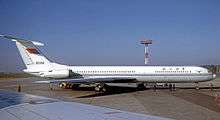Civil Aviation Administration of China
The Civil Aviation Administration of China (CAAC; simplified Chinese: 中国民用航空局; traditional Chinese: 中國民用航空局; pinyin: Zhōngguó Mínyòng Hángkōng Jú), formerly the General Administration of Civil Aviation of China (simplified Chinese: 中国民用航空总局; traditional Chinese: 中國民用航空總局; pinyin: Zhōngguó Mínyòng Hángkōng Zǒngjú), is the aviation authority under the Ministry of Transport of the People's Republic of China. It oversees civil aviation and investigates aviation accidents and incidents.[2] As the aviation authority responsible for China, it concludes civil aviation agreements with other aviation authorities, including those of the Special administrative regions of China which are categorized as "special domestic".[3] It directly operated its own airline, China's aviation monopoly, until 1988. The agency is headquartered in Dongcheng District, Beijing.[4]
| 中国民用航空局 | |
 | |
| Agency overview | |
|---|---|
| Formed | 1949 |
| Jurisdiction | |
| Headquarters | Dongcheng District, Beijing |
| Agency executive |
|
| Parent agency | Ministry of Transport |
| Website | www |
The CAAC does not share the responsibility of managing China's airspace with the Central Military Commission under the regulations in the Civil Aviation Law of the People's Republic of China (中华人民共和国民用航空法, Zhōnghuá Rénmín Gònghéguó Mínyòng Hángkōng Fǎ).
History
CAAC was formed on November 2, 1949, shortly after the founding of the People's Republic of China, to manage all non-military aviation in the country, as well as provide general and commercial flight service (similar to Aeroflot in the Soviet Union). It was initially managed by the People's Liberation Army Air Force.

In 1963, China purchased six Vickers Viscount aircraft from Great Britain, followed in 1971 with the purchase of four Hawker Siddeley Trident aircraft from Pakistan International Airlines. In August 1971 the airline purchased six Trident 2Es directly from Hawker Siddeley.[5] The country also placed provisional orders for three Concorde aircraft. With the 1972 Nixon visit to China the country ordered 10 Boeing 707 jets. In December 1973 it took the unprecedented step of borrowing £40 million from Western banks to fund the purchase of 15 additional Trident jets. Russian built Ilyushin Il-62 aircraft were used on long range routes during the 1970s and 1980s.
In 1980 the airline was transferred to the direct control of the State Council.
In 1988 CAAC Airlines was divided up into a number of individual air carriers, each named after the region of China where it had its hub. Since then, CAAC acts solely as a government agency and no longer provides commercial flight service.
In March 2008, CAAC was made a subsidiary of the newly created Ministry of Transport, and its official Chinese name was slightly adjusted to reflect its being no longer a ministry-level agency. Its official English name has remained Civil Aviation Administration of China.
On 11 March 2019, the CAAC was the first civil aviation authority to ground the Boeing 737 MAX.[6] After so doing, most of the world's aviation authorities grounded the MAX, including the European Union Aviation Safety Agency the next day.[7] It took the US Federal Aviation Administration until 13 March to ground the MAX.[8] Aviation commentators saw this as having bolstered the global reputation of the CAAC at the expense of the FAA.[9][10][11]
CAAC Airlines
Current Role
Currently, CAAC is an administrative department mostly intended to supervise aviation market. CAAC releases route applications every week and for routes that don't fly to an open-sky country/region, there will be monthly scoring releases that determine the score for each of them. CAAC subsequently grant those whose score highest on the list permission to start.
CAAC also issue frequent operation data and notices.
List of directors
List of Directors of the Civil Aviation Administration of China:[12]
- Zhong Chibing (November 1949 – October 1952)
- Zhu Huizhao (October 1952 – June 1955)
- Kuang Rennong (June 1955 – June 1973)
- Ma Renhui (June 1973 – June 1975)
- Liu Cunxin (June 1975 – December 1977)
- Shen Tu (December 1977 – March 1985)
- Hu Yizhou (March 1985 – February 1991)
- Jiang Zhuping (February 1991 – December 1993)
- Chen Guangyi (December 1993 – June 1998)
- Liu Jianfeng (June 1998 – May 2002)
- Yang Yuanyuan (May 2002 – December 2007)
- Li Jiaxiang (December 2007 – January 2016)
- Feng Zhenglin (January 2016 – present)
Affiliated universities
- Civil Aviation University of China (CAUC) in Tianjin
- Civil Aviation Flight University of China (CAFUC) in Sichuan
See also
- Transport in the People's Republic of China
- List of airports in the People's Republic of China
- China's busiest airports by passenger traffic
- List of airlines of the People's Republic of China
- Civil Aviation Department (Hong Kong)
- Civil Aviation Authority (Macau)
External links
| Wikimedia Commons has media related to Civil Aviation Administration of China. |
- CAAC Official site (in Chinese)
- CAAC Official site (Archive)
- Flight Inspection Center of CAAC (in English)/(in Chinese)
- China - Civil Aviation
- Civil Aviation Management Institute of China, Civil Aviation Safety Institute (in Chinese)
References
- http://www.caac.gov.cn/en/GYMH/LDJS/
- the citation is in the treaty "Air Services Arrangement between the Mainland and the Hong Kong Special Administrative Region" which calls intranational service as "specially managed domestic" this needs a proper ref statement.
- "English Archived September 6, 2009, at the Wayback Machine." Civil Aviation Administration of China. Retrieved on June 9, 2009. "北京市东城区东四西大街155号."
- Tridents for China, Flight International, 2 September 1971, p. 348
- For a full timeline of the groundings, see Boeing 737 MAX groundings § Regulators.
- "EASA suspends all Boeing 737 Max operations in Europe". European Union Aviation Safety Agency. 2019-03-12. Retrieved 2019-09-18.
- "Emergency Order of Prohibition" (PDF). Federal Aviation Administration. 2019-03-13. Retrieved 2019-03-13.
- "Chinese air safety regulators gain global influence as FAA refuses to ground Boeing 737 Max". Los Angeles Times. 2019-03-13. Retrieved 2019-09-18.
- "Across the globe, a question of air safety becomes a question of American leadership". Los Angeles Times. 2019-03-15. Retrieved 2019-09-18.
- Isidore, Chris. "Boeing desperately needs to get the 737 Max back in the air. Getting it approved will be hard". CNN. Retrieved 2019-09-18.
The 737 Max does not appear close to flying again. Aviation experts doubt global regulators will act in concert to approve the 737 Max for flight, because serious questions remain about how and why the FAA approved the 737 Max for flight and whether it rushed the certification process.
- "历任局长" (in Chinese). Civil Aviation Administration of China. Retrieved 17 December 2017.